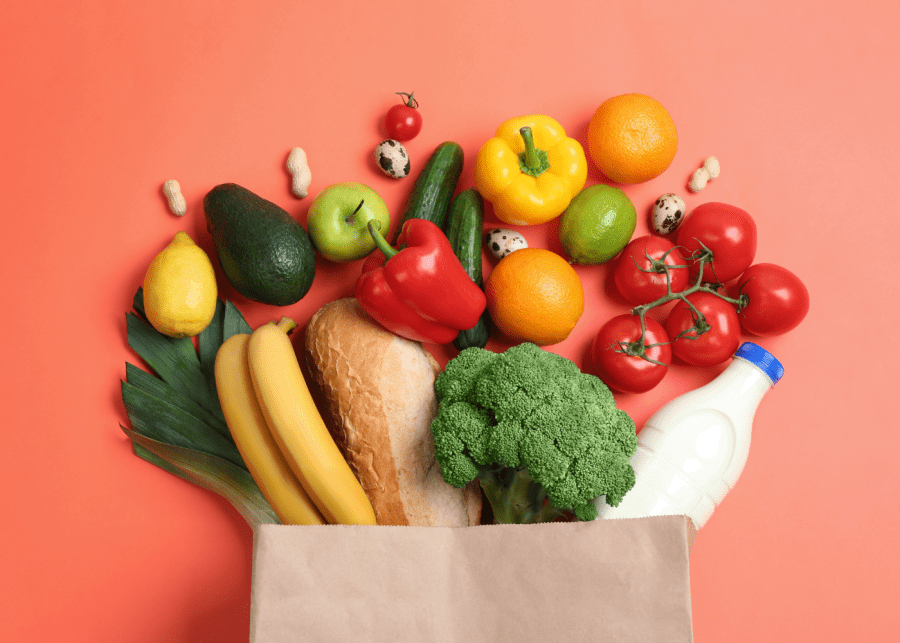
We're here to help you watch what you don't eat. Chew on these hacks to cut down on food waste in Singapore.
Did you know Singaporeans generated 744 million kg of food waste in 2019? That’s equivalent to the weight of 51,000 double-decker buses! And the amount has increased by about 20% in the last decade. If you’ve been taking small steps towards living a plastic-free and zero-waste lifestyle, we applaud you. Want to help tackle the food waste problem in Singapore too? Here are a few simple and totally doable hacks.
How to reduce food waste in Singapore
1. Create a meal plan

It pays to think ahead. That’s why you should plan your week and set realistic goals. If you’re always out and about, factor in those days when you’re meeting friends and family to dine out. When you’re eating at home, jot down the recipes you’ll cook. The more detailed you are, the better. It’ll help you reduce food waste and save money – win-win! Can’t cook to save your life or hate the clean-up that comes after? Sign up for a healthy meal delivery service.
2. List it all down
Once you’ve got your week of recipes mapped out, shop for specific items you need. Make sure it’s all written down on a notepad… or your notes app. Better yet, stick a white or blackboard on your fridge so you’re always updated. Check in with the fam so everyone’s on board and you don’t end up with 10 cartons of milk.
3. Snap a pic of your fridge

Don’t have time to make a list and check it twice? We feel ya – just take a “shelfie” on your way out. Even if you have a detailed grocery list, it’s easier to know what’s on your shelf at home. A few quick pics of the items in your fridge and pantry will help you shop responsibly and in smaller quantities. No guessing games here…
4. Donate to food banks
While the average household wastes food daily, there are people in Singapore who struggle to meet their basic food requirements. Do your bit by choosing to donate excess edibles to food banks across the island like Food Bank Singapore, Willing Hearts, Food from the Heart and more. You can also check out charities like Zero Waste SG for more info or download sustainability-focused apps like Olio that connect you with the community to share surplus food or pass on pre-loved goods.
5. Show leftovers some love

We know it’s inevitable. Leftovers are a regular part of our lives and we just can’t escape them. But just because items are a smidge bruised or old doesn’t make them unfit to eat. Designate one dinner a week to finish up all your leftovers. With a little creativity (and some ideas from TikTok), surplus ingredients can easily be transformed into gourmet meals. Try making overripe fruits and veggies into breakfast smoothies or banged-up tomatoes into pasta sauce. Alternatively, you can toss all your leftover stew with pasta or ladle it over rice. For a little inspiration, here’s a list of our fave five-ingredient recipes.
6. Store items the right way
Fact: not all fruits and vegetables should go into the fridge. Some are best kept at room temperature, while others can be frozen to prolong their shelf life. Mind blown? Put your Googling skills to use and research how to store ingredients properly. For example, fresh fruit like apples and berries will last longer if they’re left in their original packaging and kept in your fridge’s crisper drawer. Veggies should be stored in a different compartment, away from fruits, and items like mushrooms are best stashed in paper bags.
7. Stop over-ordering (while you’re hangry)

We’ve all been there. Eating out or grocery shopping when you’re hungry often leads to food wastage. Make a conscious effort to portion just what you need – you can always go back for seconds! And if you end up with more food than you can finish at restaurants, go ahead and bag it up for your next meal at home. Nobody will bat an eyelid.
8. Compost your food waste
Food scraps are unavoidable, especially if you love cooking. But guess what – you can easily compost food at home so it doesn’t go into the bin. We’re talking about fruit and veggie remnants, coffee grounds, egg shells and tea bags. There are plenty of tips out there for beginners – all you have to do is get started on your journey towards reducing your impact on the planet.
Follow these simple steps to combat food wastage in Singapore!

